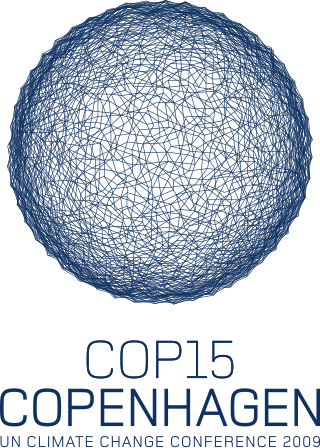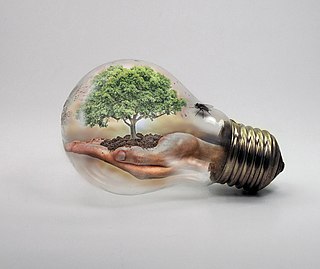
The Kyoto Protocol (Japanese: 京都議定書, Hepburn: Kyōto Giteisho) was an international treaty which extended the 1992 United Nations Framework Convention on Climate Change (UNFCCC) that commits state parties to reduce greenhouse gas emissions, based on the scientific consensus that global warming is occurring and that human-made CO2 emissions are driving it. The Kyoto Protocol was adopted in Kyoto, Japan, on 11 December 1997 and entered into force on 16 February 2005. There were 192 parties (Canada withdrew from the protocol, effective December 2012) to the Protocol in 2020.
The United Nations Framework Convention on Climate Change (UNFCCC) established an international environmental treaty to combat "dangerous human interference with the climate system", in part by stabilizing greenhouse gas concentrations in the atmosphere. It was signed by 154 states at the United Nations Conference on Environment and Development (UNCED), informally known as the Earth Summit, held in Rio de Janeiro from 3 to 14 June 1992. Its original secretariat was in Geneva but relocated to Bonn in 1996. It entered into force on 21 March 1994.

The United Nations Environment Programme (UNEP) is responsible for coordinating responses to environmental issues within the United Nations system. It was established by Maurice Strong, its first director, after the United Nations Conference on the Human Environment in Stockholm in June 1972. Its mandate is to provide leadership, deliver science and develop solutions on a wide range of issues, including climate change, the management of marine and terrestrial ecosystems, and green economic development. The organization also develops international environmental agreements; publishes and promotes environmental science and helps national governments achieve environmental targets.
Rio Convention relates to the following three conventions, which were agreed at the Earth Summit held in Rio de Janeiro in June 1992.

The United Nations Conference on Environment and Development (UNCED), also known as the RioConference or the Earth Summit, was a major United Nations conference held in Rio de Janeiro from June 3 to June 14, 1992.
Post-Kyoto negotiations refers to high level talks attempting to address global warming by limiting greenhouse gas emissions. Generally part of the United Nations Framework Convention on Climate Change (UNFCCC), these talks concern the period after the first "commitment period" of the Kyoto Protocol, which expired at the end of 2012. Negotiations have been mandated by the adoption of the Bali Road Map and Decision 1/CP.13.

Yvo de Boer is an advisor and consultant on international environmental policy. De Boer is the former Executive Secretary of the United Nations Framework Convention on Climate Change (UNFCCC), a position he held from 2006 until 2010. After his UN tenure, de Boer was Global Chairman of Climate Change and Sustainability Services at KPMG. From 2014 to 2016 de Boer was Director-General of the Global Green Growth Institute (GGGI), a Seoul-based international environmental organization.

The 2009 United Nations Climate Change Conference, commonly known as the Copenhagen Summit, was held at the Bella Center in Copenhagen, Denmark, between 7 and 18 December. The conference included the 15th session of the Conference of the Parties to the United Nations Framework Convention on Climate Change (UNFCCC) and the 5th session of the Conference of the Parties serving as the meeting of the Parties to the Kyoto Protocol. According to the Bali Road Map, a framework for climate change mitigation beyond 2012 was to be agreed there.

Kevin Mark Conrad, born in the United States to parents living in Papua New Guinea in 1968, is a Papua New Guinean businessman and environmentalist. He grew up in the Arapesh tribe near Wewak, East Sepik Province and graduated from Ukarumpa High School in the Eastern Highlands Province.
Women Engage for a Common Future (WECF), formerly known as Women in Europe for a Common Future, is a non-governmental organization established in 1994 following the 1992 Earth Summit in Rio de Janeiro. The aim of the organization is to "achieve an equitable and sustainable healthy environment for all". WECF is a network of more than 150 women's and environmental organizations in 50 countries worldwide. WECF also works on national, European, UN and international political levels with the aim to increase women's influence in political decision-making processes.

Karen Christiana Figueres Olsen is a Costa Rican diplomat who has led national, international and multilateral policy negotiations. She was appointed Executive Secretary of the UN Framework Convention on Climate Change (UNFCCC) in July 2010, six months after the failed COP15 in Copenhagen. During the next six years she worked to rebuild the global climate change negotiating process, leading to the 2015 Paris Agreement, widely recognized as a historic achievement.

The United Nations Climate Change Conferences are yearly conferences held in the framework of the United Nations Framework Convention on Climate Change (UNFCCC). They serve as the formal meeting of the UNFCCC parties to assess progress in dealing with climate change, and beginning in the mid-1990s, to negotiate the Kyoto Protocol to establish legally binding obligations for developed countries to reduce their greenhouse gas emissions. Starting in 2005 the conferences have also served as the "Conference of the Parties Serving as the Meeting of Parties to the Kyoto Protocol" (CMP); also parties to the convention that are not parties to the protocol can participate in protocol-related meetings as observers. From 2011 to 2015 the meetings were used to negotiate the Paris Agreement as part of the Durban platform, which created a general path towards climate action. Any final text of a COP must be agreed by consensus.

The Global Green Growth Institute (GGGI) is a treaty-based inter-governmental international development organization headquartered in Seoul, South Korea.

The 2016 United Nations Climate Change Conference was an international meeting of political leaders and activists to discuss environmental issues. It was held in Marrakech, Morocco, on 7–18 November 2016. The conference incorporated the twenty-second Conference of the Parties (COP22), the twelfth meeting of the parties to the Kyoto Protocol (CMP12), and the first meeting of the parties to the Paris Agreement (CMA1). The purpose of the conference was to discuss and implement plans about combatting climate change and to "[demonstrate] to the world that the implementation of the Paris Agreement is underway". Participants work together to come up with global solutions to climate change.
Janos Pasztor is a Hungarian diplomat. His current role is Senior Fellow at the Carnegie Council for Ethics in International Affairs and Executive Director of the Carnegie Climate Geoengineering Governance Initiative. He was Assistant Secretary-General in the Executive Office of the Secretary-General of the United Nations in New York City and Senior Adviser to the Secretary-General on Climate Change between January 2015 and December 2016. Previously he has held positions at the World Wide Fund for Nature International where he was Policy and Science Director and acting Director for Conservation.

Martha Rojas Urrego is a biologist, ecologist and humanitarian, gender and environmental advocate. She is a Colombian and French national. In August 2016 she was appointed as the Secretary General of the Ramsar Convention on Wetlands. Previously she was Head of Global Advocacy and Acting Deputy Secretary General at humanitarian organization CARE International.

Action for Climate Empowerment (ACE) is a term adopted by the United Nations Framework Convention on Climate Change (UNFCCC). It refers to Article 6 of the Convention's original text (1992), focusing on six priority areas: education, training, public awareness, public participation, public access to information, and international cooperation on these issues. The implementation of all six areas has been identified as the pivotal factor for everyone to understand and participate in solving the complex challenges presented by climate change. The importance of ACE is reflected in other international frameworks such as the Sustainable Development Goals ; the Global Action Programme for Education for Sustainable Development ; the Aarhus Convention (2011); the Escazú Agreement (2018) and the Bali Guidelines (2010).
The Earth Summits are decennial meetings of world leaders, organized since 1972 with help of the United Nations, to help defining ways to stimulate sustainable development at the global level. The aim is to bring together the best individuals and organisations humanity can bring forward from all kind of categories of life, to identify and update what are humanity's most pressing challenges, to quantify them, identify solutions and develop a plan of action not to run into a wall. This plan of action is called Agenda 21 and implemented by many local governments under the name Local Agenda 21. The plan of action is designed as a TQM - Total Quality Manual, designed smartly and open enough, so that also organisations, companies and individuals can use it as a basis for their own plan of action and guidance not to miss out on important issue; it helps speed up understanding and identifying partners by e.g. using similar wordings and symbols. The 2000-2015 Millennium Development Goals and the 2015-2030 Global Goals are results from these Earth Summits. The first summit took place in Rio de Janeiro (Brazil) in 1992. Last Earth Summit, called Rio+20, also took place in Rio de Janeiro in 2012.

The Global Center on Adaptation (GCA) was founded on 18 September 2018. Hosted by the Netherlands, GCA engages in policy activities, research, communications, and technical assistance to government and the private sector, policy development, research, advocacy, communications, and partnerships. GCA's floating headquarters is hosted by the Netherlands in Rotterdam, with regional offices in Africa, South Asia, and Asia Pacific.

Sustainable Development Goal 13 is to limit and adapt to climate change. It is one of 17 Sustainable Development Goals established by the United Nations General Assembly in 2015. The official mission statement of this goal is to "Take urgent action to combat climate change and its impacts". SDG 13 and SDG 7 on clean energy are closely related and complementary.














